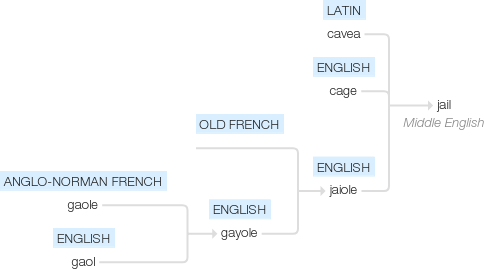Jail
Middle English: based on Latin cavea (see cage). The word came into English in two forms, jaiole from Old French and gayole from Anglo-Norman French gaole (surviving in the spelling gaol ), originally pronounced with a hard g, as in goat .
wiktionary
From Middle English gayole, gaylle, gaille, gayle, gaile, via Old French gaiole, gayolle, gaole, from Medieval Latin gabiola, for Vulgar Latin *caveola, a diminutive of Latin cavea(“cavity, coop, cage”). Doublet of cage.
etymonline
jail (n.)
c. 1300 (c. 1200 in surnames) "a jail, prison; a birdcage." The form in j- is from Middle English jaile, from Old French jaiole "a cage; a prison," from Medieval Latin gabiola "a cage," from Late Latin caveola, diminutive of Latin cavea "a cage, enclosure, stall, coop; a hollow place, a cavity" (see cave (n.)).
The form in g- was the more usual in Middle English manuscripts (gaile, also gaiole), from Old French gaiole "a cage; a prison," a variant spelling that seems to have been frequent in Old North French, which would have been the system familiar to Norman scribes. Now pronounced "jail" however it is spelled. Persistence of gaol (preferred in Britain) is "chiefly due to statutory and official tradition" [OED], and, probably, the fact that it is known the Americans spell it the other way.
In U.S. usually a place of confinement for petty offenders. The Medieval Latin word also is the source of Spanish gayola, Italian gabbiula.
jail (v.)
"to put in jail, to confine as if in jail," c. 1600, from jail (n.). Related: Jailed; jailing.
